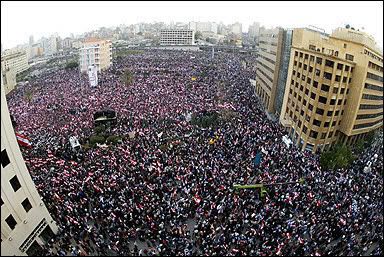
"One solitary Arab country has never been under absolute Muslim hegemony: multi-ethnic, multi-cultural and religiously heterogeneous Lebanon. For this, it has paid a price - even before Persian Shi'ite radicals took power in Teheran in 1979 and set up Hizbullah in 1982.
In 1958, for instance, Sunni nationalists tried to force the country into the pan-Arab orbit under Egypt's Abdul Gamal Nasser. The Christians, then less fragmented, more numerous and wielding clout, said no and were backed by president Dwight Eisenhower. By 1975, civil war had pitted Muslims against Christians, drawing in the PLO, Syria and Israel; it lasted into the 1990s.....
Israel, needing to defend its northern border - first against Palestinian incursions, more recently against Hizbullah - has repeatedly been drawn into the quagmire.
... Iran's proxies are led by Hizbullah,.. include Nabih Berri's (Shi'ite) Amal and Michel Aoun's Free Patriotic Movement.... competing against the Sunni-led "March 14 coalition" backed by Saudi Arabia and headed by Sa'ad Hariri. Other members include the mercurial Druse leader Walid Jumblatt and former Phalangist chieftain Samir Geagea....
TWO BIG news stories frame the lead-up to the voting. Hizbullah and its allies say they've uncovered a spy ring working for Israel .....The other big story, revealed over the weekend in Germany's Der Spiegel, ...lay the blame at Hizbullah's - not Syria's - doorstep....
Even the rosiest election result scenario - a slight gain for the anti-Iranian bloc - would not fundamentally shift Lebanon's alignment of forces. The prime minister, as always, will be a Sunni, the president a Christian and the parliament speaker a Shi'ite. Sorry to say, Hizbullah will remain the dominant social, political and economic movement - regardless of how many seats its partisans capture. It has the guns, the cash and the backing of a ruthless regional power.
It's hard to see how US Vice President Joe Biden's Friday visit to Beirut, coming on the heels of Secretary of State Hillary Clinton's trip last month and aimed at tacitly bolstering the relative moderates, did much good. The last thing the "moderates" need is to be publicly embraced by Washington. They know that the West has been loath to confront Hizbullah or its patron, and that's what matters.
In February 2005, in the wake of the Hariri murder, tens of thousands of Lebanese demonstrated in the streets, eventually forcing Syria to withdraw its troops from the country. There was a fleeting sense that, just maybe, the forces of extremism had been routed. But the following month, Hizbullah massed far greater numbers, dashing hopes that popular sentiment alone could overcome the Iran-Hizbullah behemoth.
Rather than going for an overt power grab, Hizbullah is slowly metastasizing deep inside Lebanon's body politic. The process offers a sobering glimpse into Iran's regional modus operandi and its patient imperial designs."
No comments:
Post a Comment